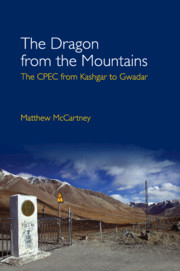Book contents
- Frontmatter
- Dedication
- Contents
- List of Maps and Figures
- List of Tables
- Preface
- Acknowledgements
- 1 Introduction
- 2 Big Infrastructure: Big Problems or Big Benefits?
- 3 CPEC Spillovers Rippling Outwards
- 4 Through the Eyes of Who? Evaluating the Success of the CPEC
- 5 The Dragon Uncoils: Special Economic Zones (SEZs) from Shenzhen to Africa
- 6 The Dragon's Embrace: Pakistan–China Trade Policy
- 7 The Will of the Dragon: The Importance of an Industrial Policy
- 8 Conclusion: The Way of the Dragon or the Way of the Falcon?
- Bibliography
- Index
2 - Big Infrastructure: Big Problems or Big Benefits?
Published online by Cambridge University Press: 06 August 2021
- Frontmatter
- Dedication
- Contents
- List of Maps and Figures
- List of Tables
- Preface
- Acknowledgements
- 1 Introduction
- 2 Big Infrastructure: Big Problems or Big Benefits?
- 3 CPEC Spillovers Rippling Outwards
- 4 Through the Eyes of Who? Evaluating the Success of the CPEC
- 5 The Dragon Uncoils: Special Economic Zones (SEZs) from Shenzhen to Africa
- 6 The Dragon's Embrace: Pakistan–China Trade Policy
- 7 The Will of the Dragon: The Importance of an Industrial Policy
- 8 Conclusion: The Way of the Dragon or the Way of the Falcon?
- Bibliography
- Index
Summary
The existing work on the CPEC tends to be structured around best guesses or aspirational hopes about the likely impact of the big transport infrastructure projects that are being planned and constructed. So far there is a complete absence of academic engagement with the voluminous existing academic literature of big infrastructure and the potential relevance of these results for the CPEC. Existing studies of big infrastructure offer useful results and research methodologies with which to think about analysing the impact of the CPEC. These include modest studies looking at the impact of a single piece of infrastructure, studies that aggregate numerous infrastructure projects to measure their total impact (or ‘social saving’), studies that focus on the macroeconomic impact of infrastructure projects and more recent studies that have used hugely impressive big data sets to study infrastructure.
MODEST STUDIES OF SINGLE INFRASTRUCTURE PROJECTS
The most widely used form of appraisal for a single road, rail or energy infrastructure project is that of a cost–benefit analysis (CBA). A CBA attempts to forecast the economic benefits to households and firms of infrastructure projects by calculating changes in travel costs, including time savings, reduced operating costs and improved safety. These direct transport impacts are applied both to existing users and to potential new users. New users are those travellers that shift to the now cheaper, faster or more reliable infrastructure by taking new routes or longer journeys. The flows of benefits over time are quantified in monetary terms, discounted to place a current value on the stream of future benefits and then compared to the capital and operating cost of the project. If the discounted benefits exceed the discounted costs, the project is profitable. There are well-known problems with CBA. These include how to place a monetary value on people's time and how to quantify safety improvements or reductions in the wear and tear on vehicles (Holl 2006). Conducting a CBA is standard practice when planning and financing new infrastructure. The academic literature on big infrastructure has used backward-looking CBA, not forecasting before, but evaluating after, the construction of big infrastructure. There are many such examples.
Gunasekara, Anderson and Lakshmanan (2008) examine the impact of the 1987 rehabilitation of two roads connecting Colombo in central Sri Lanka and the central city of Kandy with the north of the island.
- Type
- Chapter
- Information
- The Dragon from the MountainsThe CPEC from Kashgar to Gwadar, pp. 27 - 48Publisher: Cambridge University PressPrint publication year: 2021



